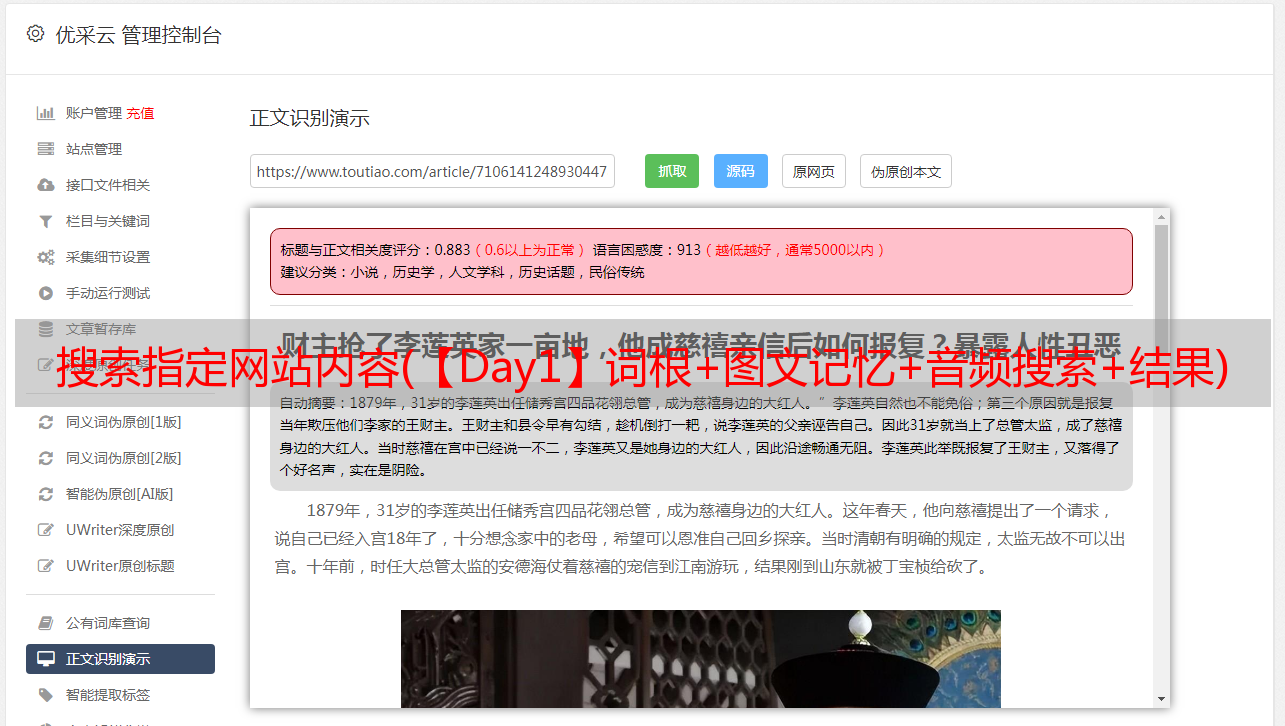搜索指定网站内容(【Day1】词根+图文记忆+音频搜索+结果)
优采云 发布时间: 2022-01-19 10:07搜索指定网站内容(【Day1】词根+图文记忆+音频搜索+结果)
源代码和结果:%E7%99%BE%E5%BA%A6%E7%88%AC%E8%99%AB%E7%B3%BB%E5%88%97
在【爬虫百度搜索一】单个关键词URL结果汇总(给定关键词和页数)我们根据关键词得到查询URL结果,存入save_file_name.txt,然后需要save_file_name。在txt中逐行读取采集的URL,抓取给定URL中的所有URL。
相关文章
【百度系列一】多关键词图片搜索结果汇总
【百度系列二】关键词搜索url结果汇总(给定关键词和页数)
【百度系列III】深度搜索(给定URL采集所有URL)
目的
给定一个URL和一个存储文件,在页面采集的所有URL下,可以指定文件存储。
思考
使用lxml解析工具解析请求的文本,分析url在网页中的位置和标签,会出现三种情况:
通过 href 获得的格式良好的 url。获取是相对路径:如“/game”,需补充“”格式。通过href获取的以“javascript”开头,跳过。代码
#coding:utf-8
# 网页url采集爬虫,给定网址,以及存储文件,将该网页内全部网址采集下,可指定文件存储方式
#author@ 许娜
#os : ubuntu16.04
#python: python2
import requests,time
from lxml import etree
"""
url:给定的url
save_file_name:为url存储文件
"""
def Redirect(url):
try:
res = requests.get(url,timeout=10)
url = res.url
except Exception as e:
print("4",e)
time.sleep(1)
return url
def requests_for_url(url, save_file_name, file_model):
headers = {
'pragma': "no-cache",
'accept-encoding': "gzip, deflate, br",
'accept-language': "zh-CN,zh;q=0.8",
'upgrade-insecure-requests': "1",
'user-agent': "Mozilla/5.0 (Windows NT 6.1; WOW64) AppleWebKit/537.36 (KHTML, like Gecko) Chrome/59.0.3071.115 Safari/537.36",
'accept': "text/html,application/xhtml+xml,application/xml;q=0.9,image/webp,image/apng,*/*;q=0.8",
'cache-control': "no-cache",
'connection': "keep-alive",
}
try:
response = requests.request("GET", url, headers=headers)
selector = etree.HTML(response.text, parser=etree.HTMLParser(encoding='utf-8'))
except Exception as e:
print ("页面加载失败", e)
return_set = set()
with open(save_file_name,file_model) as f:
try:
context = selector.xpath('//a/@href')
for i in context:
try:
if i[0] == "j":
continue
if i[0] == "/":
print i
i = url+i.replace("/","");
f.write(i)
f.write("\n")
return_set.add(i)
print(len(context),context[0],i)
except Exception as e:
print("1",e)
except Exception as e:
print("2",e)
return return_set
if __name__ == '__main__':
# 网页url采集爬虫,给定网址,以及存储文件,将该网页内全部网址采集下,可指定文件存储方式
url = "http://news.baidu.com/"
save_file_name = "save_url_2.txt"
return_set = requests_for_url(url,save_file_name,"a") #“a”:追加
print(len(return_set))
源代码和结果:



